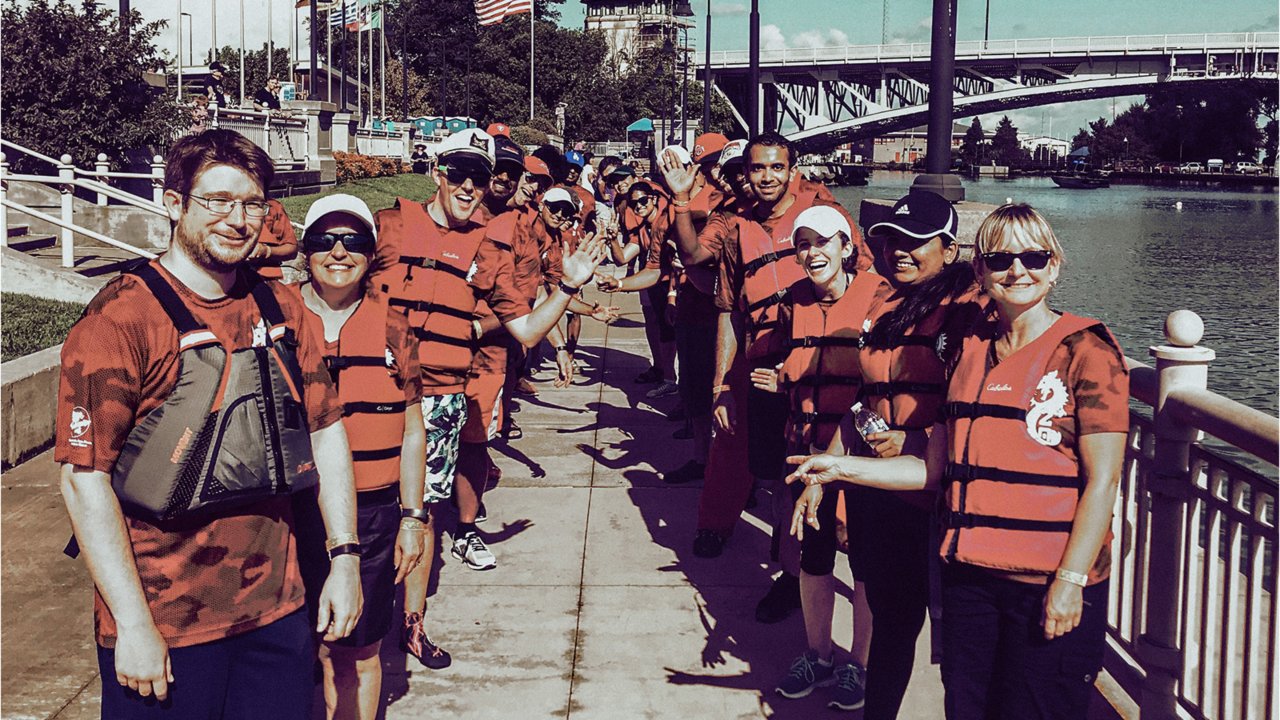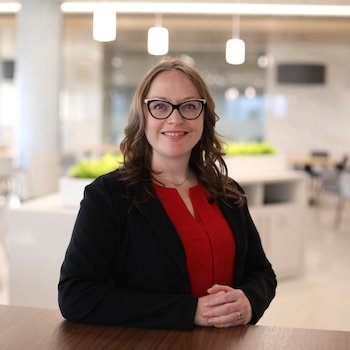In honor of National Military Awareness Month, leaders of the Military Veterans & Allies Group (MVAG) employee resource group (ERG) sat down to share their thoughts about the group, its purpose and its influence on Rockwell veteran employees.
This Q&A features Tony Canapa, Product Manager, U.S. Navy Veteran and president of MVAG, and Cari Tralongo, Lean Project Manager, U.S. Air Force Veteran and board member of MVAG.
What is MVAG, and why does it exist?
Toby: The stated mission of MVAG is to leverage Rockwell veteran employees to help recruit, transition, and support current or future employees that have a military background or provide a platform for employees to learn more about armed forces veterans.
There’s a unique set of experiences people have when they go into the military – it's a subculture within the world or the U.S. As people leave the military, they have a specific perspective on things. They may come from different places, but that military experience creates a common bond for veterans. The transition from military to civilian life can be difficult, so it’s good to have an opportunity for people to go back to that comfortable space where they’re able to engage with others who understand what they have been through and where they are going. It could be a veteran, a spouse or child of a veteran, or an ally.
Cari: The word that comes to mind is camaraderie. It's such a big part of being in the military, and it’s a big piece of what we enjoy about the military, so that is something that you look for in your next endeavor.
What is the role of MVAG for Rockwell veteran employees?
Cari: One thing MVAG can do is work with new hires that are veterans, especially those who are coming off immediately from active duty or full-time service. It’s important for them to connect with someone who is also a veteran to help acclimate them to the Rockwell and civilian environment, to be able to “speak the language” of the corporate world, initially. When you’re in the military, policies and procedures are a big deal – you live your life according to them. But out of the military, it’s a little different.
Toby: As for what veteran employees can provide for the company as a whole, they have a particular culture of service and self-sacrifice, and there are also desirable skillsets people develop in the military. Those include both hard and soft skills of teamwork, work ethic, a sense of duty, self-confidence, resilience and discipline. We want to attract veteran candidates to Rockwell to help the company grow, and to help veteran employees be successful in the roles they are in.
Cari: Leadership is an important skill, too. The military is big on teaching different levels of leadership and how to supervise and coach and lead people.
Toby: Hard skills like electronics expertise, for example, in missile tracking systems, are skills that can translate to automation systems and that can make veterans successful employees at Rockwell Automation. That’s why we have the Academy of Advanced Manufacturing, a training program exclusively for veterans.
What type of programming does MVAG plan for members and employees?
Toby: Something that’s central to MVAG – and to veteran culture – is volunteering. That’s a huge part of what we do, targeting veteran causes in the community. Going into the military is, for most people, a reflection of their dedication to service and sacrifice. There's absolutely an extension of that within the ERG.
Cari: There’s a strong attachment to helping veterans, whether it’s internally or externally with volunteering events. There’s a lot of desire to continue to help other veterans, including working with the U.S. Department of Veterans Affairs (VA) and doing what we can from a volunteer standpoint.
Toby: Prior to COVID-19, we would get together in person onsite at the Milwaukee and Cleveland offices. We would have social events to connect, talk about what the ERG is doing, and host presentations. We usually planned a week of events around Armed Forces Day in May, including a bake sale to raise money and invited speakers to present. Also, we’d plan events around Veterans Day in November. We sponsor volunteer opportunities for our members, hold fundraisers, host social events, and present educational topics based around the military. We have had limited events in the past year due to the pandemic, but we plan to resume our events and add more virtual options as work transitions back to “normal.”
Why should veterans consider working at Rockwell?
Cari: You’re not stereotyped here. The culture teaches diversity, and there are opportunities within our company to learn more about other groups and events. Through all of that learning, it’s created a culture where we are free to be our authentic self and nobody’s judging us. I feel like Rockwell took a chance on me – whereas some things could be assumed about me because of my background, people here have approached me with an open mind. That’s really inviting to someone coming out of the military. You're allowed to speak your voice, and it’s heard, and that’s a good thing.
Toby: The organization is as successful as the willingness of people to put effort and time into it. We think there’s a terrific opportunity for veterans to have an increased presence at Rockwell and provide good opportunities for those veterans to develop themselves and their careers. We want to make the whole experience as good as possible.


